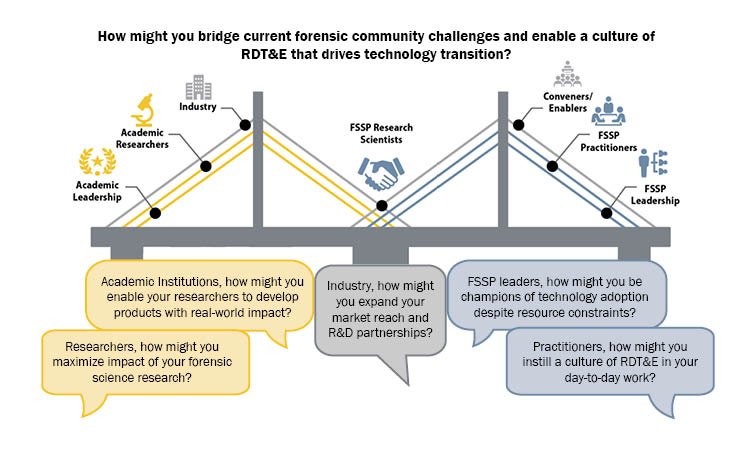Forensic Laboratory Needs Technology Working Group (FLN-TWG)
The National Institute of Justice (NIJ), in partnership with the Forensic Technology Center of Excellence (FTCOE) at RTI International, formed the Forensic Laboratory Needs Technology Working Group (FLN-TWG). The FLN-TWG supports NIJ’s mission to improve knowledge and understanding of the forensic technology needs of federal, state, local, and tribal forensic practitioners and crime laboratories. flntwg
A Roadmap to Improve Research and Technology Transition in Forensic Science
 Date
Date
October 2023
Overview
The research, development, validation, and subsequent adoption of forensic technology are critical steps to continuous improvement in the forensic community. Successful technology implementation stems from productive research and development (R&D) to address practitioner needs, testing and evaluation to improve the technology, validation of the technology, and finally broad adoption across multiple FSSPs. However, realities of the forensic science community can often lead to siloed efforts and limit the productive partnerships that drive the creation of value-adding technologies. As a result, innovative technologies do not make the transition from research product to implementation and end up in a “valley of death” that limits broad adoption. Despite strong forensic community motivation toward research and development, testing, and evaluation (RDT&E), many promising technologies fall short of implementation without proper resources and planning.
This roadmap is intended to accomplish the following:
- Articulate actions for forensic community members to improve the transition of research and technology into adoption by FSSPs.
- Highlight research partnership opportunities to improve alignment between researchers and FSSPs to help advance knowledge, simplify FSSP workflows, create functional products, and improve justice.
- Improve the process of research, development, testing and evaluation, validation, and adoption of technologies into the forensic community.
- Enhance collaboration around shared goals that solve problems while saving time and resources.
- Improve awareness of forensic community perspectives and emphasize a shared lexicon.
- Drive understanding of realities and opportunities for forensic community research.
Funding for this Forensic Technology Center of Excellence report was provided by the National Institute of Justice, Office of Justice Programs, U.S. Department of Justice.
The opinions, findings, and conclusions or recommendations expressed in this report are those of the author(s) and do not necessarily reflect those of the U.S. Department of Justice.
Contact us at ForensicCOE@rti.org with any questions and subscribe to our newsletter for notifications.




